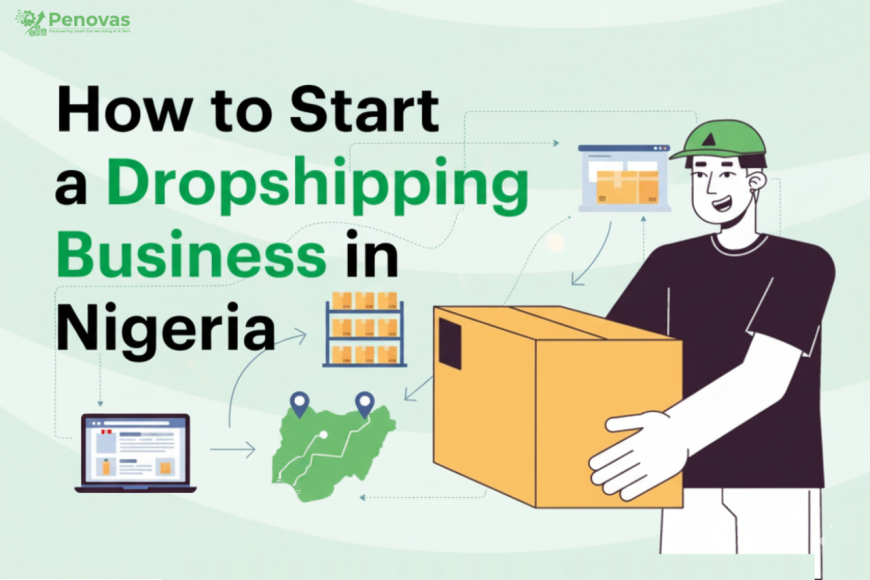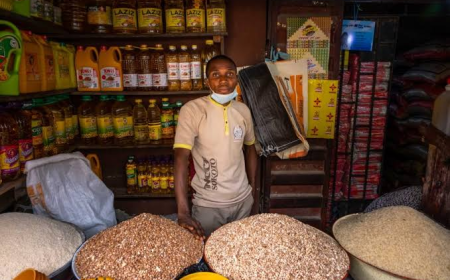Beginner’s Guide to Dropshipping in Nigeria + 30-Day Roadmap
The complete Beginner’s Guide to Dropshipping in Nigeria with 30-Day Roadmap that guarantee success

Dropshipping has become one of the most popular online business models worldwide — and Nigeria is no exception. With limited capital, internet access, and the right suppliers, anyone can launch a dropshipping store and start selling products online without holding inventory.
If you’re new to the idea, this guide will walk you step by step through what dropshipping is, how it works in Nigeria, the tools you need, common challenges, and how to succeed as a beginner.
What is Dropshipping?
Dropshipping is an online retail model where you sell products to customers without keeping stock. Instead of buying items in bulk, you only purchase a product from a supplier after a customer has paid you. The supplier then ships the product directly to the customer, and you keep the profit margin.
Example:
-
You create an online store and list a wristwatch for ₦15,000.
-
A customer orders it and pays you ₦15,000.
-
You buy the same watch from your supplier at ₦9,000.
-
The supplier ships directly to your customer.
-
Your profit = ₦6,000.
Why Dropshipping is a Great Business in Nigeria
-
Low startup capital – You don’t need millions to begin.
-
Wide product range – You can sell fashion items, electronics, beauty products, home accessories, etc.
-
No inventory worries – Suppliers handle storage and shipping.
-
Scalable – As your sales grow, you can expand your product catalog easily.
-
Access to global and local markets – You can sell within Nigeria or even target international buyers.
Steps to Start Dropshipping in Nigeria
1. Research Your Market & Niche
Don’t try to sell everything. Instead, focus on products that are in demand and profitable. Popular niches include:
-
Fashion & accessories (clothes, shoes, jewelry, watches)
-
Beauty & skincare products
-
Tech gadgets & accessories (earphones, phone cases, chargers)
-
Home & kitchen products
-
Baby & kids’ products
Tips for research:
-
Use Google Trends to check product popularity.
-
Browse Jumia, Konga, or AliExpress for trending products.
-
Check Nigerian social media trends (Twitter, Instagram, TikTok).
2. Find Reliable Suppliers
The success of dropshipping depends on suppliers. In Nigeria, you can source from:
-
Local suppliers/wholesalers: Lagos (Alaba, Trade Fair, Balogun), Aba, Onitsha.
-
Online marketplaces: Jumia, Konga (sign up for seller programs).
-
International suppliers: AliExpress, Alibaba, 1688.com (using shipping agents).
What to look for in suppliers:
-
Good product quality
-
Fast delivery times
-
Affordable prices
-
Clear return/refund policy
3. Choose a Platform to Sell
You need a storefront to display your products. Options include:
-
E-commerce stores: Build with Shopify, WooCommerce (WordPress), Wix, or Flutterwave Store.
-
Marketplaces: Jumia, Konga, or PayPorte.
-
Social media: Instagram, Facebook Marketplace, WhatsApp Business.
👉 Beginners often start with Instagram/WhatsApp, then scale to Shopify or WooCommerce for more control.
4. Set Up Your Online Store
If using Shopify/WooCommerce:
-
Buy a domain name (₦6,000–₦10,000/year).
-
Get hosting (₦20,000–₦50,000/year for WordPress).
-
Install a store theme.
-
Upload product pictures, descriptions, and prices.
If using social media:
-
Create a professional Instagram & Facebook page.
-
Use WhatsApp Business for easy catalog setup and communication.
-
Post high-quality images/videos of products.
5. Market Your Store
No matter how beautiful your store is, without marketing, no one will buy. Focus on:
-
Social media ads – Run Facebook/Instagram ads targeting Nigerians interested in your niche.
-
Influencer marketing – Partner with micro-influencers on Instagram or TikTok.
-
WhatsApp marketing – Create a broadcast list and post regularly on status.
-
Content marketing – Write blogs, make videos, or create product demos.
6. Handle Payments
Customers in Nigeria prefer secure, simple payment methods. Options include:
-
Paystack
-
Flutterwave
-
Interswitch
-
Bank transfer / USSD
-
Cash on delivery (still popular but riskier)
👉 Always make payments easy and trustworthy to encourage sales.
7. Manage Shipping & Delivery
You need a reliable logistics partner. Options include:
-
GIG Logistics
-
Kwik Delivery
-
DHL (for international)
-
Sendbox
-
Local dispatch riders (for Lagos, Abuja, Port Harcourt, etc.)
Tips:
-
Be upfront with delivery time (2–5 days within Nigeria, longer for international).
-
Offer free or discounted delivery as a promotion.
-
Track packages and update customers.
Common Challenges in Dropshipping (Nigeria)
-
Unreliable suppliers – Some delay shipping or supply fake products.
Solution: Vet your suppliers, test orders before selling. -
Delivery delays – Especially from China.
Solution: Use local suppliers where possible; for China, use reliable shipping agents. -
High competition – Many are already selling trending items.
Solution: Differentiate with better branding, packaging, or bundles. -
Customer trust issues – Nigerians fear scams.
Solution: Show testimonials, offer payment on delivery for new customers, be transparent. -
Payment failures – Some customers don’t trust online payments.
Solution: Provide multiple options (bank transfer, POS, COD).
How Much Do You Need to Start?
You can start dropshipping in Nigeria with as little as ₦50,000–₦100,000, mainly for:
-
Store setup (domain + hosting or Shopify plan)
-
Marketing (ads, influencer deals)
-
Logistics arrangements (first few deliveries)
Unlike traditional businesses, you don’t need to buy inventory upfront.
How Much Can You Earn?
Earnings depend on sales volume and product margins. For example:
-
Sell 50 units of a ₦9,000 product at ₦15,000.
-
Profit = ₦6,000 × 50 = ₦300,000.
With consistent sales and marketing, many Nigerian dropshippers earn ₦100k–₦500k monthly, while advanced ones scale into millions.
Tips to Succeed as a Beginner
-
Start with 1–3 products in a niche, not a whole supermarket.
-
Focus on marketing — it drives sales.
-
Test small with ads (₦5,000–₦10,000 daily) before scaling.
-
Always over-communicate with customers — Nigerians value updates.
-
Collect reviews and testimonials for trust-building.
30-Day Roadmap to Start Dropshipping in Nigeria
This plan is broken into 4 weeks, each focusing on specific milestones that will get you from zero knowledge to your first sales.
Week 1: Research & Foundation
Goal: Understand the business, choose your niche, and identify suppliers.
-
Day 1–2: Learn the basics of dropshipping (read blogs, watch YouTube tutorials, follow Nigerian dropshippers).
-
Day 3–4: Choose a niche (fashion, gadgets, beauty, home items, etc.) based on demand and profitability.
-
Day 5–6: Research products using Jumia, Konga, AliExpress, and Google Trends.
-
Day 7: Shortlist 2–3 reliable suppliers (local wholesalers or AliExpress + shipping agents).
Week 2: Store Setup
Goal: Build a professional storefront and prepare your product listings.
-
Day 8: Decide where to sell (Instagram, WhatsApp Business, Shopify, or WooCommerce).
-
Day 9–10: If using a website, buy a domain and hosting (or sign up for Shopify).
-
Day 11–12: Set up your online store (upload logo, theme, and design).
-
Day 13–14: Add your first 5–10 product listings with clear descriptions, pricing, and good images.
Week 3: Marketing & Branding
Goal: Build visibility and start attracting potential buyers.
-
Day 15: Create social media pages (Instagram, Facebook, TikTok, WhatsApp Business).
-
Day 16–17: Post engaging content (product images, videos, customer education tips).
-
Day 18–19: Start running small Facebook/Instagram ads (₦5,000–₦10,000 budget).
-
Day 20–21: Reach out to micro-influencers to promote your products.
Week 4: Launch & First Sales
Goal: Start selling and refine your process.
-
Day 22: Announce your store launch with discounts or free delivery.
-
Day 23–24: Track your ad performance — adjust targeting if needed.
-
Day 25–26: Manage first customer orders with your supplier and logistics partner.
-
Day 27–28: Collect testimonials/reviews from buyers.
-
Day 29: Optimize your store/products based on customer feedback.
-
Day 30: Celebrate your first sales and plan to scale (increase ads, add new products).
Extra Tips for Success
-
Always test suppliers before relying on them.
-
Keep customer service professional — Nigerians value trust.
-
Reinvest profits into marketing and product expansion.
-
Track expenses and revenue with simple tools (Google Sheets or Excel).
👉 By following this roadmap step by step, you can move from beginner to making your first dropshipping sales in just 30 days.
Final Thoughts
Dropshipping is one of the best online businesses for beginners in Nigeria because it requires little capital, is scalable, and can be managed from anywhere with a smartphone.
The key to success is choosing the right products, finding reliable suppliers, setting up a professional storefront, and marketing aggressively. Like every business, it requires patience, testing, and learning, but with consistency, you can build a profitable dropshipping brand in Nigeria.























